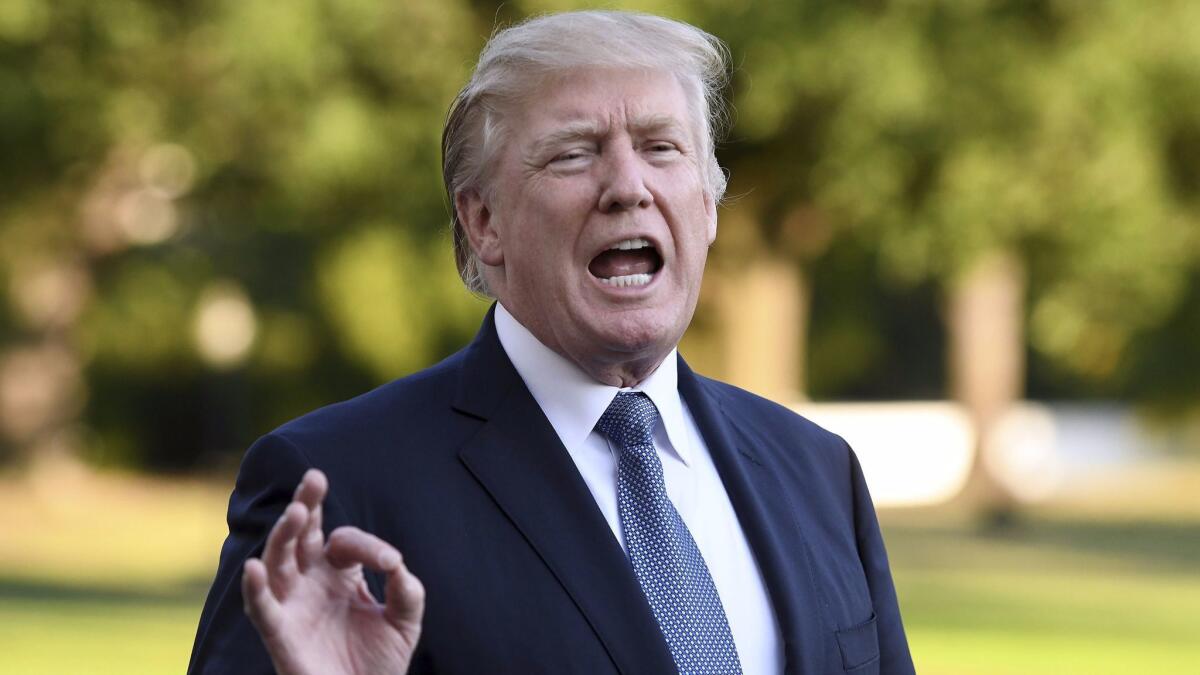Editorial: Just admit it Mr. Trump, you’re wrong about the Iran nuclear deal

- Share via
With President Trump, one can never be sure what action he will take on a controversial issue until he takes it — as he himself famously said, “You want to be unpredictable.” But several reports suggest that, after twice certifying to Congress that Iran is in compliance with the international agreement placing limits on its nuclear program, Trump will refuse to do so on Oct. 15.
That may sound like a prelude to U.S. withdrawal from the agreement, the reimposition of economic sanctions and, potentially, the resumption of nuclear activities by Iran. But to hear the Trump administration tell it, decertification wouldn’t have that effect at all.
Indeed, some of Trump’s advisors are even suggesting that decertification would lead to negotiations that would improve the agreement; they talk about a strategy of “decertify and fix.”
That scenario, however, seems highly unlikely and, frankly, it doesn’t strike us as the most likely explanation for a decision by Trump to disregard the advice of some of his key advisors and refuse to issue a third certification. A more plausible explanation is that this president is simply unable to admit that he was wrong when he denounced the agreement on the campaign trail as “the worst deal ever negotiated.”
“Decertify and fix” isn’t a considered strategy; it’s an attempt to contain the damage from a president’s refusal to admit that he was wrong.
The truth about the deal is that while it is imperfect, it is clearly in the interest of the United States. As Trump’s own defense secretary, James N. Mattis, told Congress this week, it’s “something that the president should consider staying with.” Equally important, according to the International Atomic Energy Agency, Iran has been complying with its terms.
Why is Trump being asked to certify Iranian compliance on Oct. 15? The problem lies with language in the Iran Nuclear Agreement Review Act, the law passed by Congress and reluctantly signed by President Obama in 2015.
Under the law, the president must certify every 90 days not only that Iran is complying with the letter of the nuclear agreement but also that the suspension of U.S. sanctions against Iran is “appropriate and proportionate to the specific and verifiable measures taken by Iran with respect to terminating its illicit nuclear program” and “vital to the national security interests of the United States.”
This imprecise language would allow Trump to refuse to certify Iranian compliance even though Iran has been abiding by the agreement. At that point Congress would have 60 days to debate whether to reimpose sanctions.
The premise of “decertify and fix” seems to be that Congress wouldn’t actually follow through and reimpose sanctions. Instead, the mere possibility that it might do so would pressure Iran to return to the bargaining table to make new concessions, such as extending the time period of restrictions in the agreement on its nuclear-related activities or agreeing to limits on its ballistic missile program. Supposedly, American allies would join the U.S. in pressing Iran to make further concessions.
This is a highly speculative strategy and it could easily backfire. The U.S. and its allies should explore the possibility of engaging Iran in negotiations over extending the life of the nuclear agreement or placing limitations on its ballistic missile program. But such negotiations will be less, not more, likely if Trump throws the status of the current agreement into confusion by refusing to certify Iranian compliance and tossing the issue back to Congress.
Why would Iran consider negotiating a new agreement with representatives of the U.S. when this country is attempting to undermine an agreement it signed only two years ago? And why would U.S. allies go along with this gambit? They wouldn’t.
“Decertify and fix” isn’t a considered strategy; it’s an attempt to contain the damage from a president’s refusal to admit that he was wrong. If Trump really wants to be unpredictable, he’ll put the interest of the country first and certify again that Iran is in compliance.
Follow the Opinion section on Twitter @latimesopinion and Facebook
More to Read
A cure for the common opinion
Get thought-provoking perspectives with our weekly newsletter.
You may occasionally receive promotional content from the Los Angeles Times.









